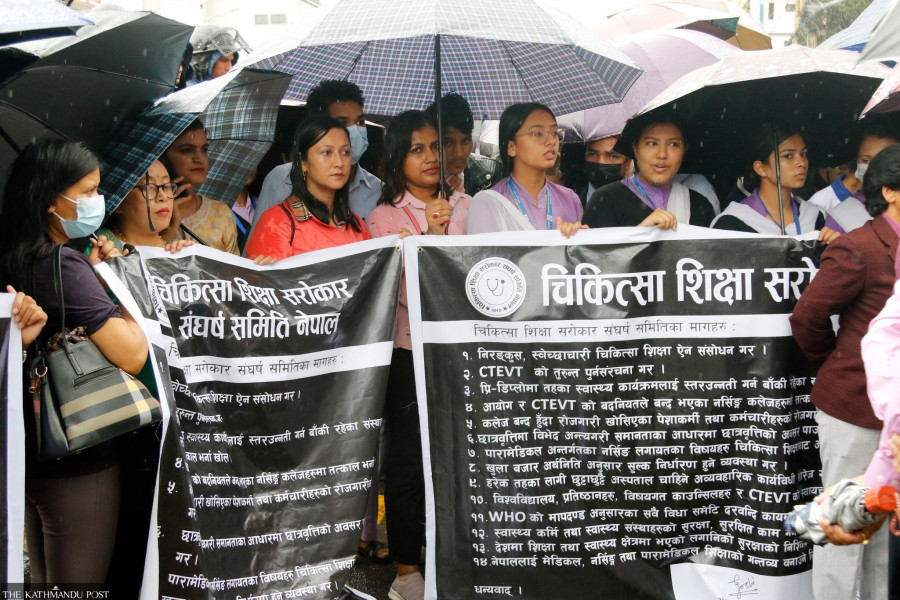National
Medical education providers say law ‘misused’ to force them out of business
According to them, the Medical Education Act is forcing hundreds of Nepali nursing students to Indian institutions.
Post Report
Five years after the promulgation of the Medical Education Act, nursing and other non-university medical education providers are on continuous protests for the past few weeks saying that the government has misused the law forcing them to halt their services.
United under the umbrella of the Medical Education Concern and Struggle Committee, the medical education providers have been staging street protests on a daily basis. They accuse the Medical Education Commission of misinterpreting a provision in the Act to target them.
Clause 11 of the Medical Education Act envisions that each college teaching nursing and dental courses must set up a 100-bed hospital. Those, who are offering medical courses of the Council for Technical Education and Vocational Training, argue the provision applies only to the colleges providing university education.
However, the Commission has been claiming all institutions offering medical education fall under its jurisdiction. The commission in 2018 had given nursing colleges two years to build their own hospitals. But the colleges couldn't build the hospitals. As a result, the commission stopped them from taking new admissions. Not just the institutions under the CTEVT lack their own hospitals, but even nursing colleges affiliated with universities also do not have hospitals.
Nirmal Sapkota, general secretary of the Forum for Health and Technical Sciences who also is a coordinator of Medical Education Concern and Struggle Committee, said, as the Medical Education Act doesn’t replace the Council for Technical Education and Vocational Training Act, their colleges don't fall under the commission's jurisdiction.
"However, the commission overstepped its jurisdiction and stopped admission in the colleges that don’t have their own hospitals," he said. A total of 228 colleges including 136 offering pre-diploma-level health education, 73 providing diploma-level staff nurse courses and 18 colleges providing bachelors in nursing and bachelors in nursing science have ceased their operation due to the commission's decision, according to the struggle committee. "Our investment of some Rs15 billion is at risk," said Sapkota.
The medical education providers citing government estimates say it costs around Rs10 million (including fixed and operating costs) to develop one hospital bed. This means they will have to spend at least one billion rupees to set up a 100-bed hospital, which they say is beyond their capacity. "Even if we build our own hospitals there wouldn’t be sufficient flow of patients to make them economically viable," said Sapkota.
Currently, nursing colleges have been partnering with government hospitals for practical training of their students.
Netra Raj Chataut, chairperson of the Forum for Health and Technical Science, said some 4,000 students would enrol on nursing courses until 2021. "But now only 1,200 seats are available for the nursing courses with a decline of 2,800," he said. The nursing college operators say though over 10,000 students sit entrance exams, most of them are deprived of studying the courses of their choice in Nepal. "They go to India to study. Dozens of nursing colleges have sprung up in the Indian cities bordering Nepal," he said.




 9.83°C Kathmandu
9.83°C Kathmandu













